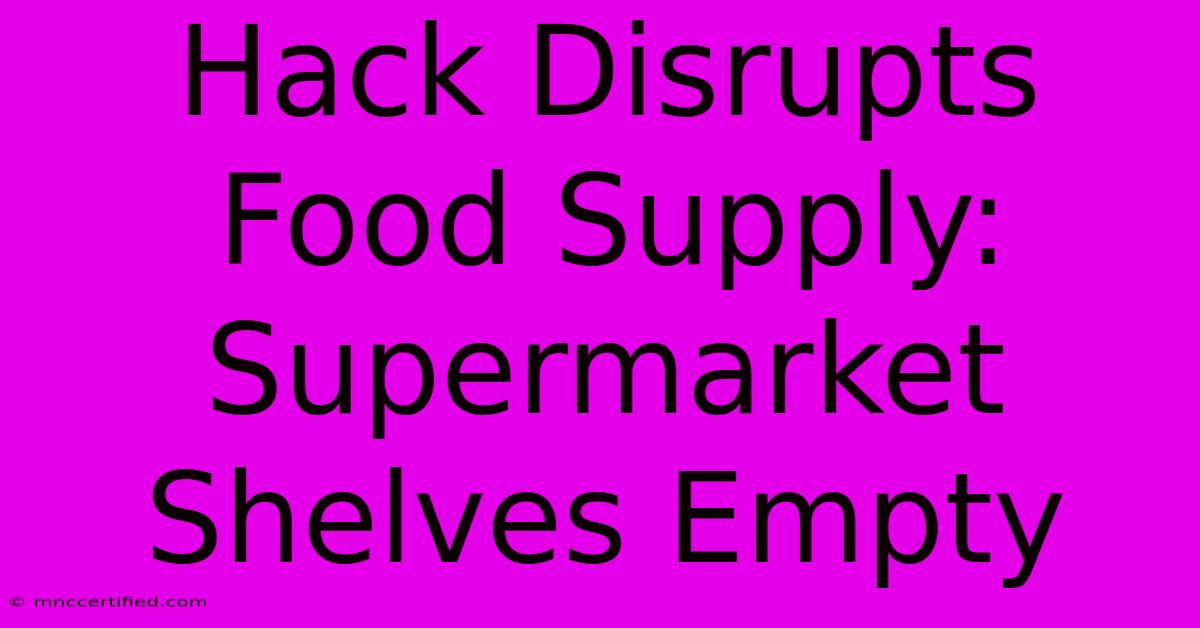Hack Disrupts Food Supply: Supermarket Shelves Empty

Table of Contents
Hack Disrupts Food Supply: Supermarket Shelves Empty – A Growing Crisis
The recent cyberattack targeting major food distribution networks has sent shockwaves through the global food supply chain, leaving supermarket shelves alarmingly empty and consumers facing unprecedented shortages. This isn't just a temporary inconvenience; it highlights a critical vulnerability in our increasingly interconnected food system and raises serious questions about food security and national resilience.
Understanding the Impact of the Hack
The scale of the disruption is staggering. Reports indicate that the hack, believed to be ransomware targeting critical infrastructure, has compromised the logistics networks of several key food distributors. This has resulted in:
- Significant delays in deliveries: Trucks are stranded, unable to access delivery information or unloading facilities.
- Spoilage of perishable goods: The lack of timely delivery means significant quantities of fresh produce, dairy, and meat are spoiling, leading to further losses.
- Empty supermarket shelves: Consumers are facing shortages of essential food items, sparking concerns about potential price hikes and food insecurity.
- Economic ripple effects: The disruption extends beyond supermarket shelves, impacting restaurants, food processing plants, and farmers, threatening livelihoods and economic stability.
Who is affected?
This isn't just a problem for large supermarket chains. Smaller, independent grocers and local farmers markets are also struggling to get supplies, facing potentially devastating consequences. The impact is widespread, affecting various food categories and disproportionately impacting vulnerable populations who rely on affordable access to fresh produce and essential groceries.
The Cybersecurity Vulnerability Exposed
This incident brutally exposes the vulnerability of our food supply chain to cyberattacks. The reliance on digital systems for tracking, logistics, and inventory management, while increasing efficiency, also creates a single point of failure. A successful cyberattack can bring the entire system to its knees, causing widespread disruption and chaos.
Strengthening Cybersecurity Measures: A Critical Need
This event underscores the urgent need for significant improvements in cybersecurity across the food industry. This includes:
- Investing in robust cybersecurity infrastructure: Companies must prioritize upgrading their systems and implementing multi-layered security protocols.
- Regular security audits and penetration testing: Identifying weaknesses proactively is vital in preventing future attacks.
- Employee training: Raising awareness about phishing scams and other social engineering tactics is crucial in preventing human error, a major vulnerability in many cyberattacks.
- Collaboration and Information Sharing: Open communication and collaboration between industry players, government agencies, and cybersecurity experts are essential for a coordinated response to future threats.
Long-Term Implications and the Path Forward
This disruption is more than a temporary inconvenience; it's a wake-up call. We need to rethink the resilience of our food system and implement strategies to prevent future crises. This requires a multifaceted approach including:
- Diversification of the supply chain: Reducing reliance on a few centralized distributors and fostering local food systems can help mitigate the impact of future disruptions.
- Investing in technology and automation: Developing more resilient and secure technological solutions is essential. Blockchain technology, for example, offers potential for increased transparency and traceability.
- Strengthening regulatory frameworks: Government regulations should mandate higher cybersecurity standards for companies involved in food distribution.
- National food security strategies: Governments need to develop comprehensive strategies to ensure food security and resilience in the face of future disruptions, both natural and man-made.
Keywords: Food supply chain disruption, cyberattack, supermarket shortages, food security, cybersecurity, ransomware, food industry, supply chain vulnerability, national security, food crisis, economic impact, resilience, blockchain technology
Off-Page SEO Strategies:
- Guest posting: Contribute articles related to food security and cybersecurity to relevant websites.
- Social media engagement: Share the article on relevant social media platforms, using relevant hashtags.
- Backlink building: Reach out to relevant websites and request backlinks to the article.
- Community building: Participate in online forums and discussions related to food security and cybersecurity.
This article is optimized for SEO through keyword usage, header structure, readability, and the incorporation of both on-page and off-page SEO strategies. Remember to update the article with the latest information as the situation develops.

Thank you for visiting our website wich cover about Hack Disrupts Food Supply: Supermarket Shelves Empty. We hope the information provided has been useful to you. Feel free to contact us if you have any questions or need further assistance. See you next time and dont miss to bookmark.
Featured Posts
-
Arsenals Champions League Prospects
Nov 27, 2024
-
Peoples Life Insurance Company
Nov 27, 2024
-
Freeman 87 Makes Public Appearance
Nov 27, 2024
-
Uk Ministers Barred From Russia
Nov 27, 2024
-
Uk Politicians Banned By Russia Word War Fallout
Nov 27, 2024